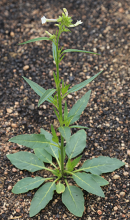Article
In traditional societies, a clan comprises an interrelated social group whose connections derive from parentage and kinship affiliations. Clan configurations develop and are expressed uniquely in different groups. In groups indigenous to the Americas, each unique group can be comprised of numerous clans. Clan names and identities often originate from the natural environment of the the group's homeland or seasonal hunting and camping grounds, and reference place names, fauna, and flora, as well as significant natural phenomena.
In the Zuni tradition, the Tobacco Clan is known as Anakwe, but tobacco clans can also be found among the Hopi, Tewa, and Diné societies as well. In Zuni society, the Koyemshi, ritual trickster figures, are chosen from four clans in annual rotation, including the Tobacco Clan. For the Hopi, the Tobacco Clan is, along with the Bear and Corn Clans, one of the three leading clans. During ceremonies, the Bear Clan brings sacred medicine, the Corn Clan brings corn, and the Tobacco Clan supplies the tobacco. Clan knowledge is sacred and protected, and particular stories are the proprietary accounts of particular clans or fraternities. It would be prohibited for the Badger Clan, for instance, to relay information regarding the symbolism and practices of the Tobacco Clan.
"Coyote tobacco plant, July 11, 2015" by Dcrjsr is licensed under CC BY.
Manuscripts
References
Courlander, Harold
1982 Hopi Voices: Recollections, Traditions, And Narratives of the Hopi Indians.
Albuquerque: University of New Mexico Press.
Kroeber, Alfred Louis
1917 Zuñi Kin and Clan. Anthropological Papers of the American Museum of Natural
History. New York: The Trustees.

